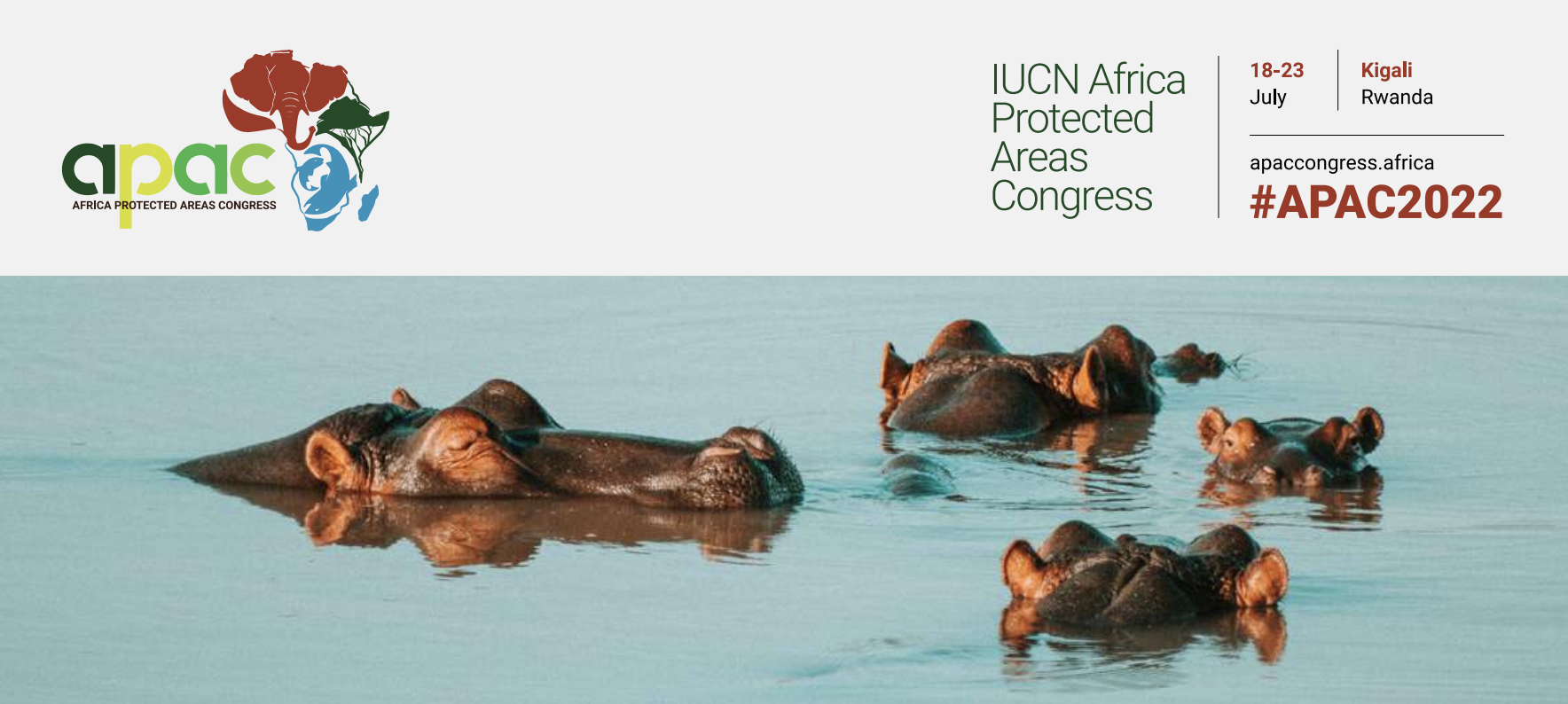
IUCN Africa Protected Areas Congress
The Wildlife Conservation Society (WCS) sent a strong delegation to the first ever IUCN Africa Protected Area Congress that took place from July 18-23 in Kigali, Rwanda. The Congress provided an essential and unique opportunity to promote policies, projects, and partnerships to ensure a sustainable future for protected areas in Africa for people and nature. The Congress also provided a unique opportunity to connect and reconnect with our longstanding and critical partners, including various Ministers from Africa and Europe.
The IUCN Africa Protected Areas Congress (APAC) is the first-ever continent-wide gathering of African leaders, civil society, and other stakeholders to discuss the role of protected areas in conserving nature, safeguarding Africa’s iconic wildlife, delivering vital life-supporting ecosystem services, promoting sustainable development while conserving Africa’s cultural heritage and traditions.
 WCS at APAC, clockwise: Robert Mwinyihali, Michel Masozera, Lovy Rasolofomanana, Joe Walston, Amrei von Hase, Sarah Olson, Gaspard Abitsi, Simon Nampindo, and Emma Stokes.
WCS at APAC, clockwise: Robert Mwinyihali, Michel Masozera, Lovy Rasolofomanana, Joe Walston, Amrei von Hase, Sarah Olson, Gaspard Abitsi, Simon Nampindo, and Emma Stokes.
Building on decades of success and significant contributions to local, national, and regional conservation across 14 African countries, WCS showcased the impact of our work and demonstrated that in addition to conserving critical wildlife and natural habitat, protected and conserved areas (PCAs) are vital anchors of economic growth, strong governance, and improved well-being and livelihoods for local communities.
Read more about WCS’s work in Africa: click here.
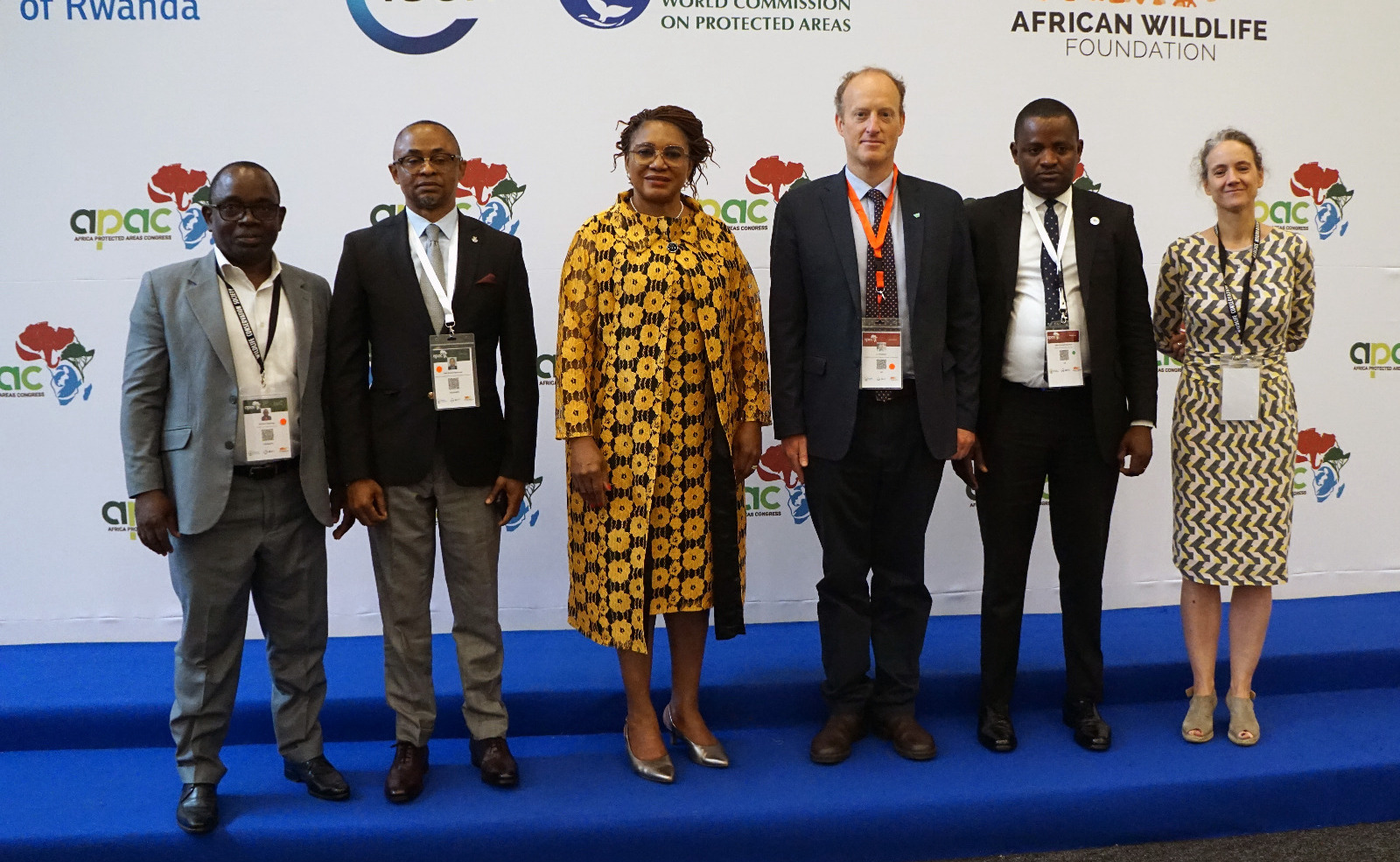
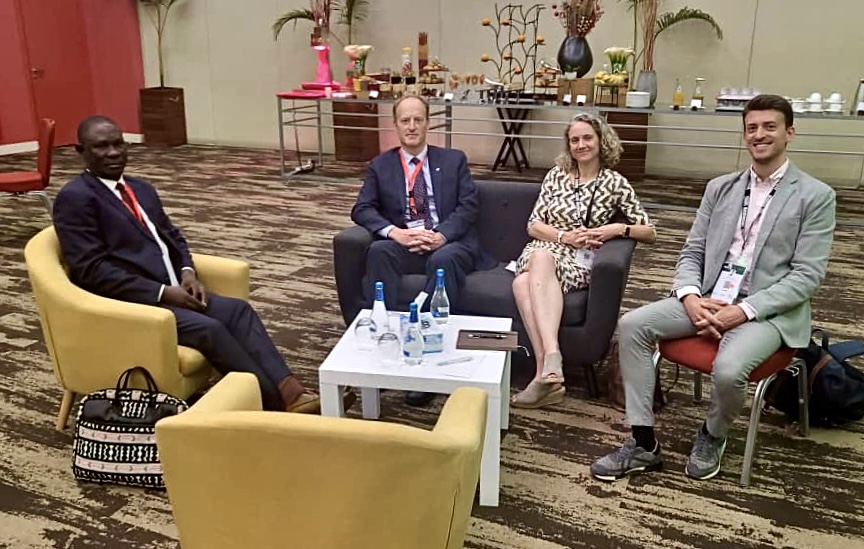 Photo 1: (center-left) Hon. Rosalie Matondo, Minister of Forest Economy, Republic of Congo, and (center-right) Joe Walston, WCS EVP. Photo 2: (from left to right) Hon. Amit Idriss, Minister of Water, Forestry, Hunting and Fishing, Central African Republic, Joe Walston (WCS), Emma Stokes (WCS), and Arnaud Goessens (WCS EU).
Photo 1: (center-left) Hon. Rosalie Matondo, Minister of Forest Economy, Republic of Congo, and (center-right) Joe Walston, WCS EVP. Photo 2: (from left to right) Hon. Amit Idriss, Minister of Water, Forestry, Hunting and Fishing, Central African Republic, Joe Walston (WCS), Emma Stokes (WCS), and Arnaud Goessens (WCS EU).
Promoting effective and equitable networks of PCAs in Africa
Joe Walston, WCS Executive Vice President, Global Conservation, provided a TEDx talk on how understanding urbanization and future trends can help Africa’s Protected Areas and other effective area-based conservation measures (OECMs). Whereas Africa is rapidly urbanizing, it is critical that the conservation community view cities as an opportunity not just a threat. Cities are the only lever known that simultaneously shifts populations, alleviates poverty, and spurs innovation, which individually and in combination have long term positive impacts on nature, human consumption and livelihoods. Improving the governance and functioning of African urban areas while simultaneously protecting and expanding Africa’s Protected Areas and OECMs, must be a part of our commitments in Kigali.
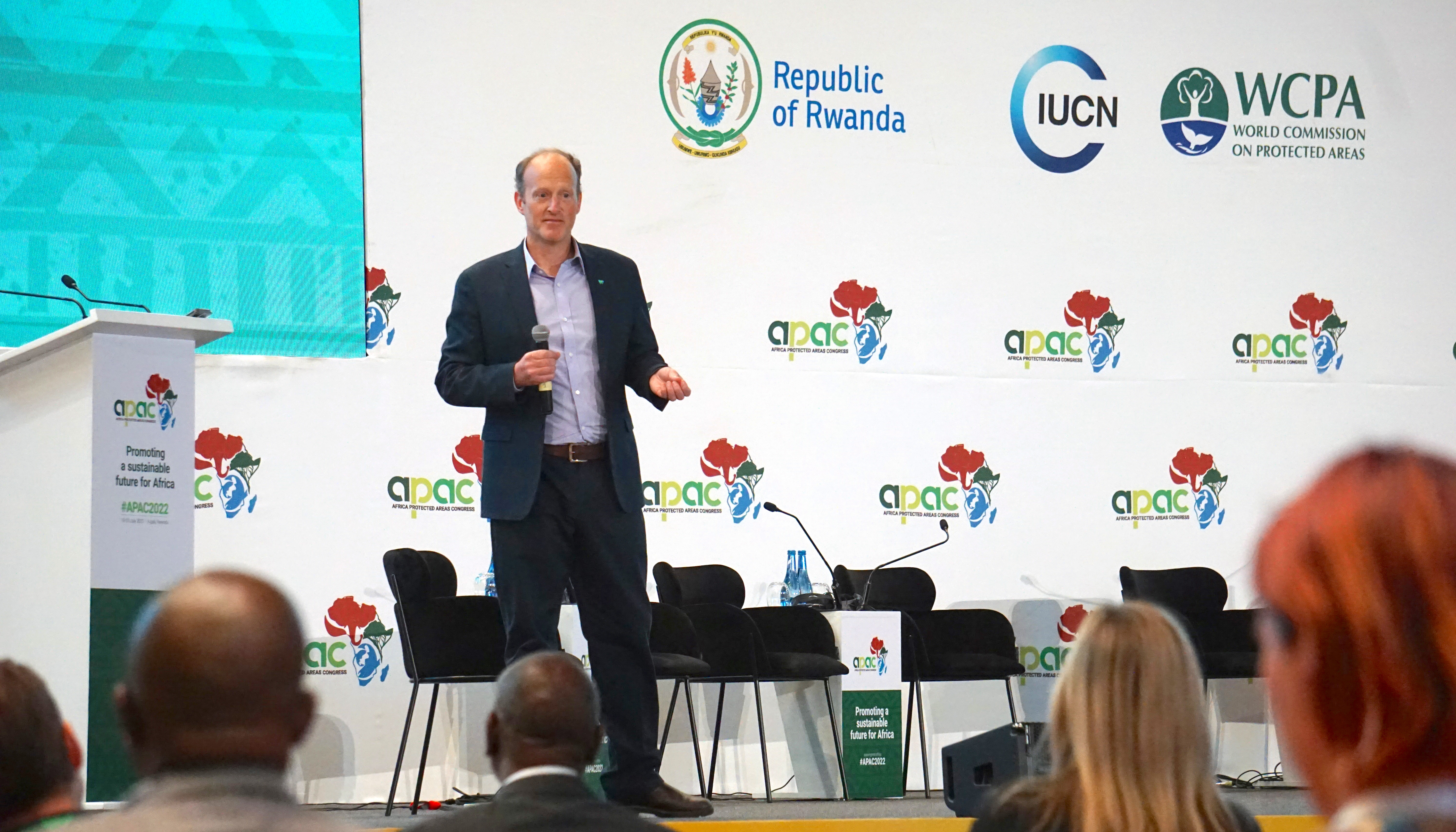
Joe Walston, WCS Executive Vice President, Global Conservation, presenting at APAC 2022.
Biodiversity stream
Michel Masozera (WCS) hosted and introduced a panel on 'Unlocking the opportunities of biodiversity conservation in Africa'. Trevor Sandwith (IUCN) moderated this panel with various speakers, including Ariella Kageruka (RDB) who delivered a TEDx on the biodiversity economy for Africa, highlighted key issues, challenges, and opportunities for the future, and reflected on what 30x30 means for Africa, Mohamed Imam Bakarr (GEF) who developed these ideas as to what we need to do differently to unlock the potential of Africa´s biodiversity and align Africa with principles for Green Growth, and Chantal Marijnissen (DG INTPA) who discussed how to move beyond the business-as-usual funding model to sustainable financing for biodiversity conservation in Africa. In particular, Ms. Marijnissen noted the importance of legal reforms and highlighted the SWM programme, which is developing innovative, collaborative, and scalable new models to conserve wildlife and improve food security for Indigenous Peoples and Local Communities (IPLCs).
The SWM programme developed a Legal-Hub, which is an online platform that offers country dedicated pages with a legal database, an overview of the level of domestication of ratified international instruments, a diagnostic of the statutory law, a diagnostic of the customary law, and a list of national institutions. The SWM Legal-Hub is unique as it provides a single and easy access point to legal texts and analysis that will increase public awareness and encourage informed and participative law reform processes to improve sustainable wildlife management. The SWM Programme is an Organisation of African, Caribbean and Pacific States (OACPS) initiative, funded by the European Union with co-funding from the French Facility for Global Environment (FFEM), and now the French Development Agency (AFD). The SWM Programme is being implemented by the FAO, CIFOR, CIRAD, and WCS. More information here.

Chantal Marijnissen (DG INTPA) speaking at a session on 'Unlocking the opportunities of biodiversity conservation in Africa' at APAC 2022.
Protected and Conserved Areas
WCS hosted and participated in multiple panels on protected and conserved areas:
- Emma Stokes (WCS Central Africa and Gulf of Guinea) presented the collaborative partnership in place between WCS and governments for the management of protected areas in Africa during a panel on 'Unlocking the potential of Collaborative Management Partnerships' .WCS supports 21 protected areas in 14 countries in Africa, in which we operate 11 Collaborative Management Partnerships (CMPs). In this session, Pablo Villanueva Hullebroeck (DG INTPA) presented NaturAfrica’s 3 pillars: governance, conservation, and development. Learn more
- Felin Twagirashyaka (WCS Central African Republic) and Afonso Madope (WCS Mozambique) held discussions on resilience-building of local communities and Mozambique's efforts to establish inclusive models for Protected Areas.
- Gaspard Abitsi (WCS Gabon), together with the Agence Nationale des Parcs Nationaux (ANPN), facilitated a session on the effective management of Marine Protected Areas in Gabon.
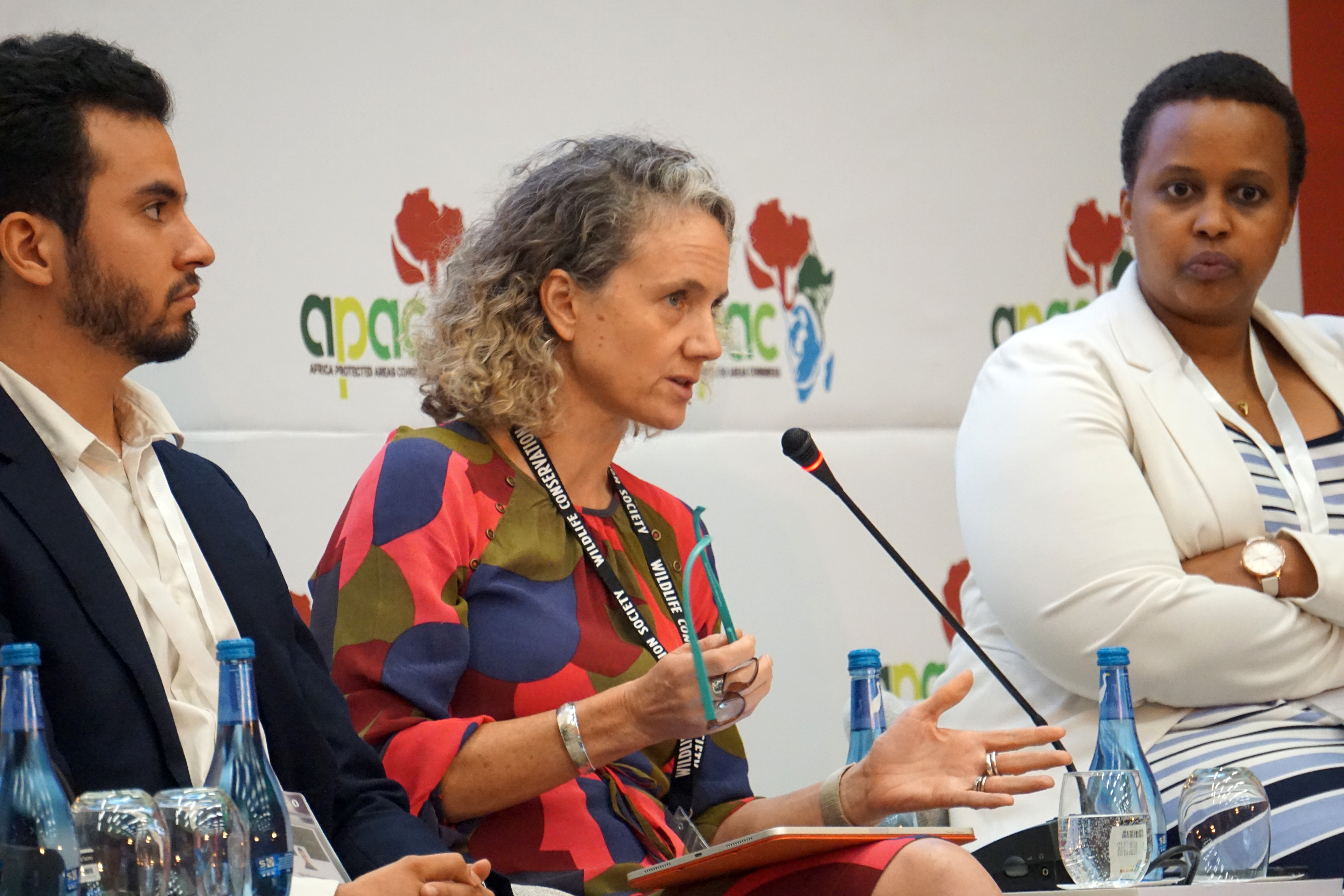
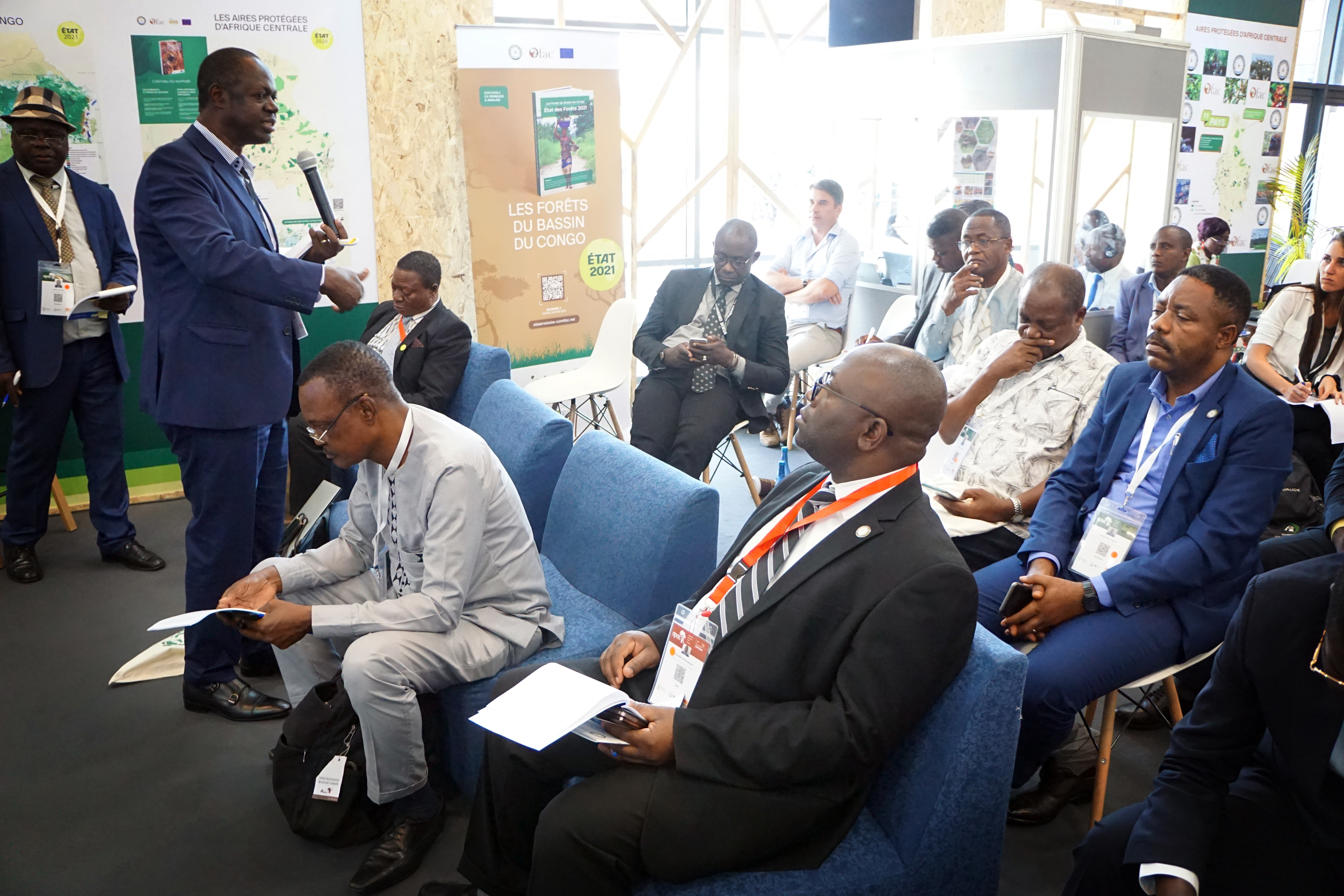
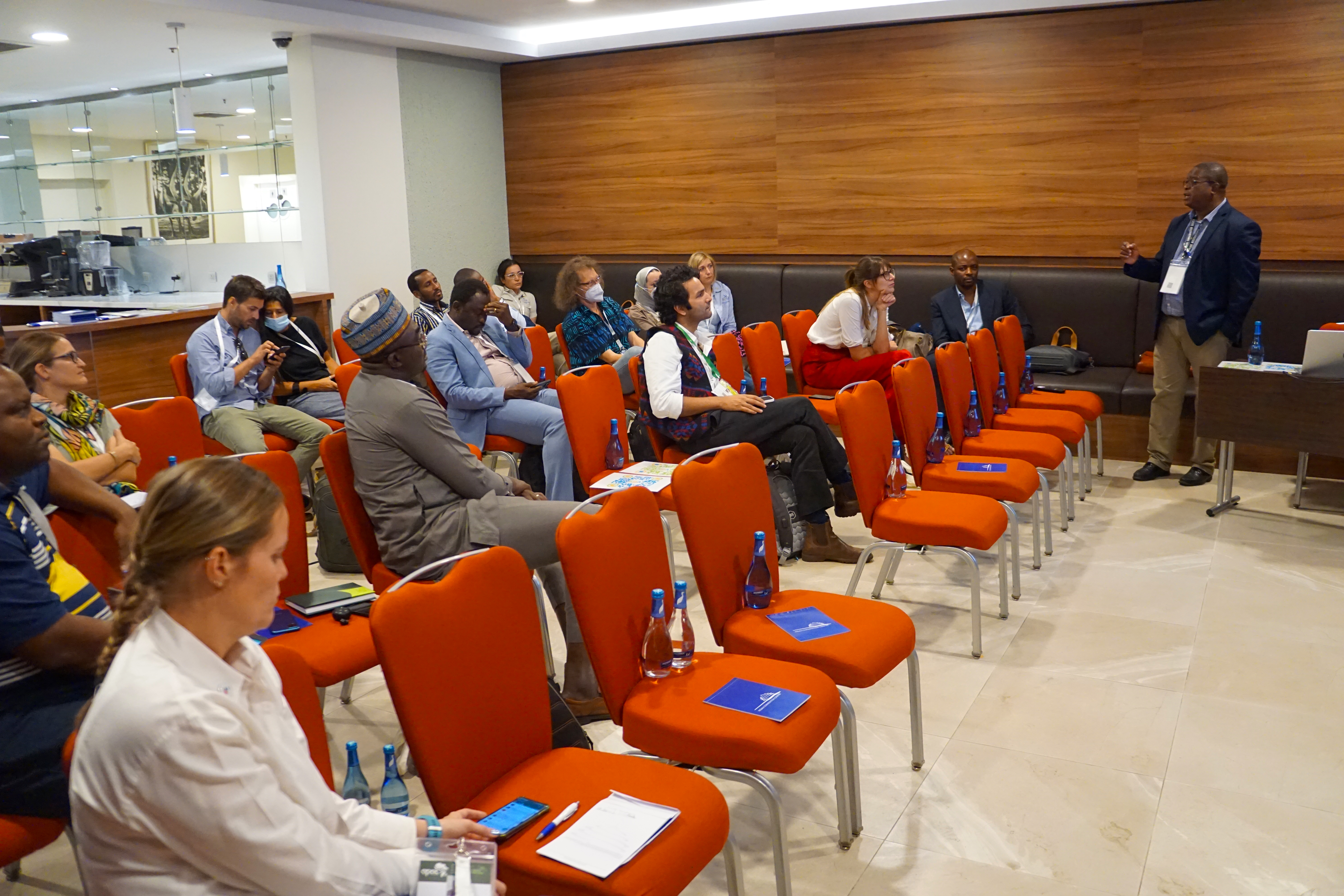 Various panelists presenting on protected and conserved areasat APAC 2022.
Various panelists presenting on protected and conserved areasat APAC 2022.
One Health approaches
WCS hosted and participated in multiple sessions as part of the One Health Pavilion organized by IUCN with support from the German Federal Ministry for the Environment, Nature Conservation, Nuclear Safety and Consumer Protection (BMUV), including:
- High-level event on One Health: “Opportunities for One Health Approach for people and biodiversity”: Gaspard Abitsi (WCS Gabon) moderated this IUCN-led event, that included keynote addresses from high-level speakers, including IUCN Deputy Director General, Stewart Maginnis; Hon. Dr. Ngamije Daniel, Minister of Health for Rwanda; and Hon. Steffi Lemke, German Federal Minister at BMUV. The event additionally included a moderated panel featuring presentations and discussions from speakers such as Dr. Madhu Rao (IUCN WCPA Chair and Senior Advisor for WCS Asia), and Dr. Chris Walzer (WCS Executive Director, Health Program), among others, highlighting different perspectives on the importance of pursuing a One Health approach to ensure the health of humans, animals and the environment, and flagging growing recognition that preventing the next pandemic is vastly cheaper than reacting to it. Learn more
- “Detect-Share-Respond: Collaborative and evidence-based approach to sustainable wildlife health and pathogen surveillance”: In this WCS-led and moderated session, speakers including Emily Denstedt (WCS Laos), Kongsy Khammavong (WCS Laos), Richard Malonga (WCS Congo), Michel Masozera (WCS Rwanda), Sarah Olson (WCS Health), and Chris Walzer (WCS Health) discussed the important role that Protected Areas and stakeholders living within and near areas with wildlife can play s in national wildlife health surveillance systems that are resilient and sustainable, by providing “eyes on the ground” to detect, share, and respond to wildlife and zoonotic health threats. WCS presented the WildHealthNet, as an example of an innovative, locally-scalable and adaptable tool and approach to establishing national and regional wildlife health surveillance. Learn more
- “Operationalizing One Health (OH) programs in Africa”: More and more countries in Africa are developing strategies and Action Plans for “One Health”, however, despite positive steps forward and significant enthusiasm, many questions remain about Operationalization: how do we move from plans to action, and what must be done? This WCS-led and moderated session brought together speakers from different regional and sectoral perspectives, to share stories from experience and create a space for discussion of emerging lessons, challenges, and ongoing questions related to the Operationalization of One Health in African contexts. Simon Nampindo (WCS Uganda) moderated the session, which included speakers such as Lovy Rasolofomanana (WCS Madagascar) and Robert Mwinyihali (WCS Democratic Republic of Congo) – who provided “on the ground” conservation experiences, including experiences implementing SWM programme activities –and Sarah Olson (WCS Health). The session additionally featured Prof. Claude Mambo Muvunyi (Rwanda Biomedical Centre/RBC), Dr. Julius Nziza (Gorilla Doctors), Dr. John Amuasi from Kwame Nkrumah University of Science and Technology (KNUST) and co-chair of the Lancet One Health Commission, and Wande Alimi (Africa CDC), who spoke from different sectoral and geographic perspectives. Lovy Rasolofomanana and Robert Mwinyihali presented the SWM programme activities in Madagascar and DRC, which aim at ensuring food security for local communities, while at the same time conserving endemic species and reducing spillover opportunities. Learn more
- “Introducing PANORAMA One Health, Learning from Inspiring Solutions”: This IUCN and EcoHealth Alliance-led session featured voices from WCS including Richard Malonga (WCS Republic of Congo) and Sarah Olson (WCS Health), who co-presented on experiences with the Republic of Congo Wildlife Mortality Monitoring Network for Human and Wildlife Health solution and provided lessons learned from WCS’s community based infectious disease surveillance from the spillover frontlines in the Northern Republic of Congo. Learn more
- “Preventing the next pandemic: Zoonotic diseases and how to break the chain of transmission”: Chris Walzer (WCS Health) participated in a panel hosted by ILRI and UNEP. Panelists discussed the peaceful co-existence of wildlife and pastoralists without compromising each other in a world where natural resources are more contested. Learn more
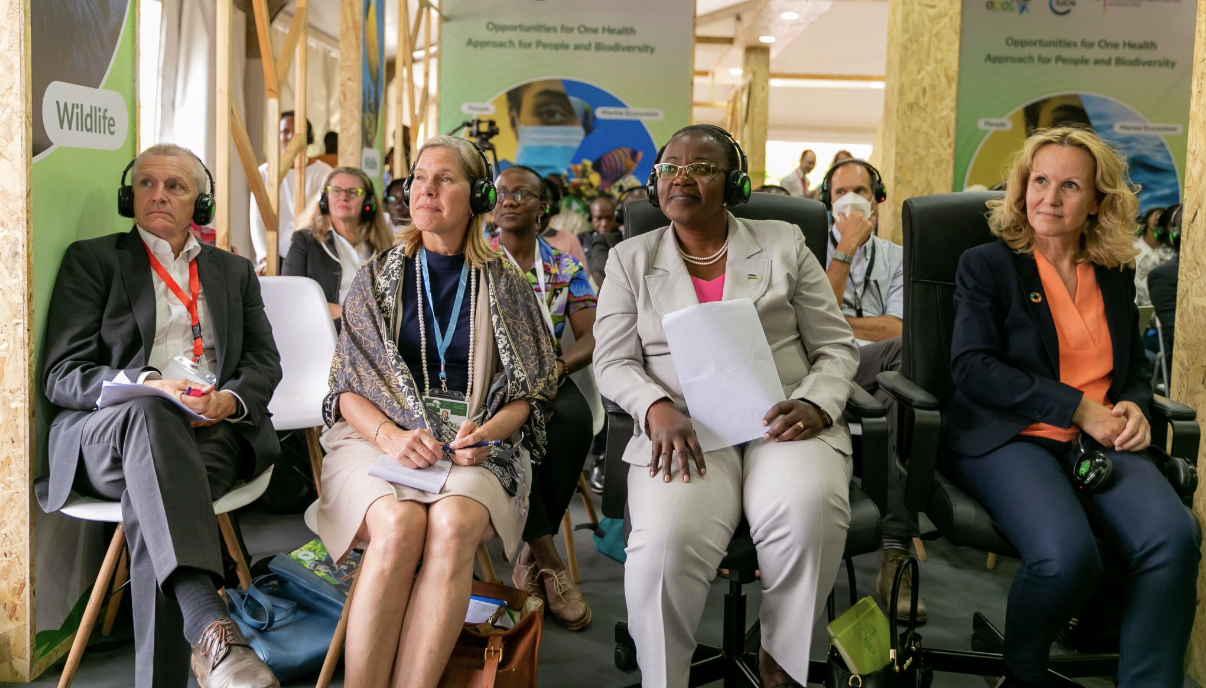
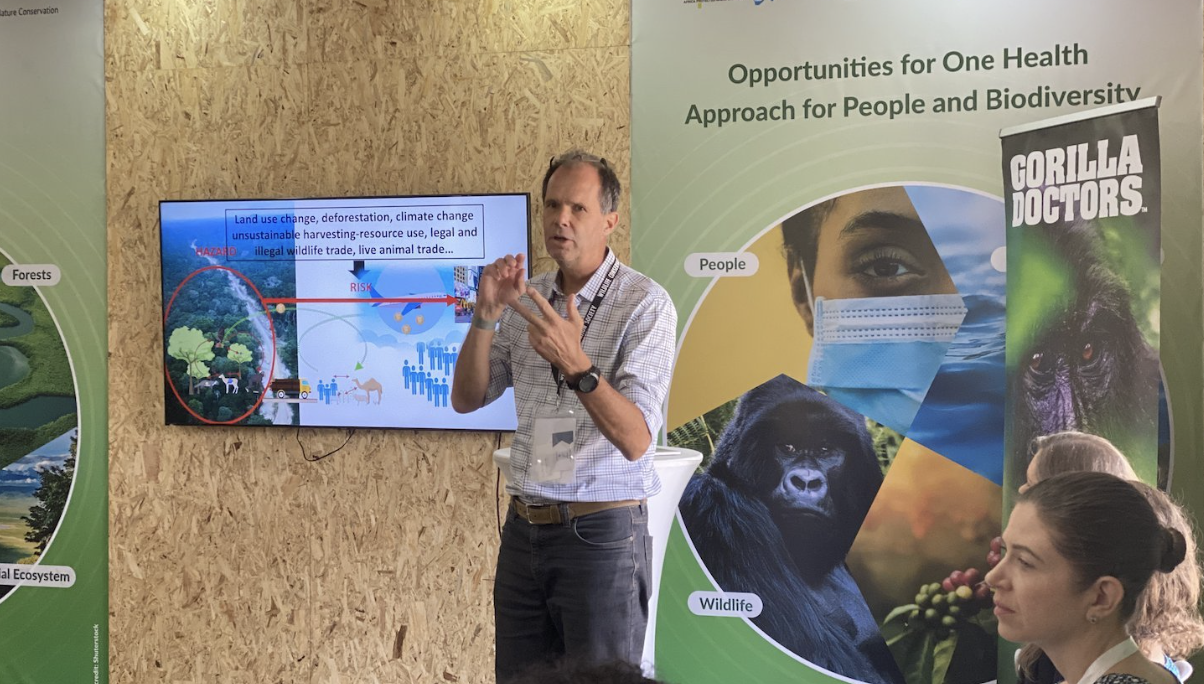
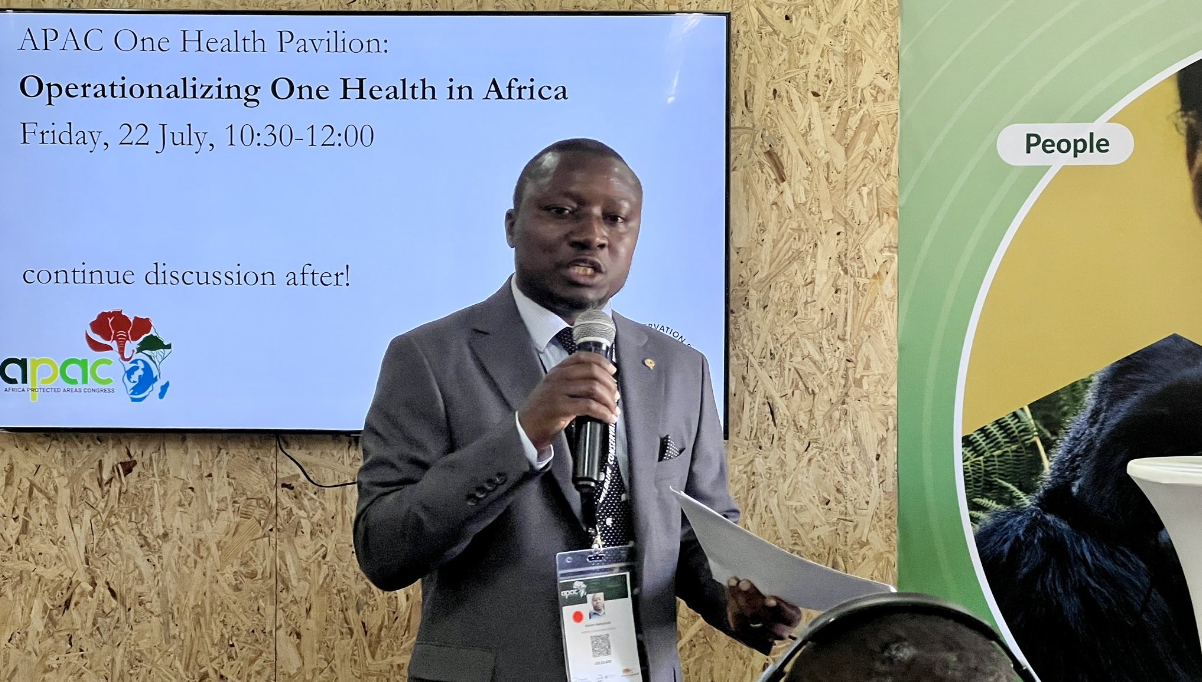
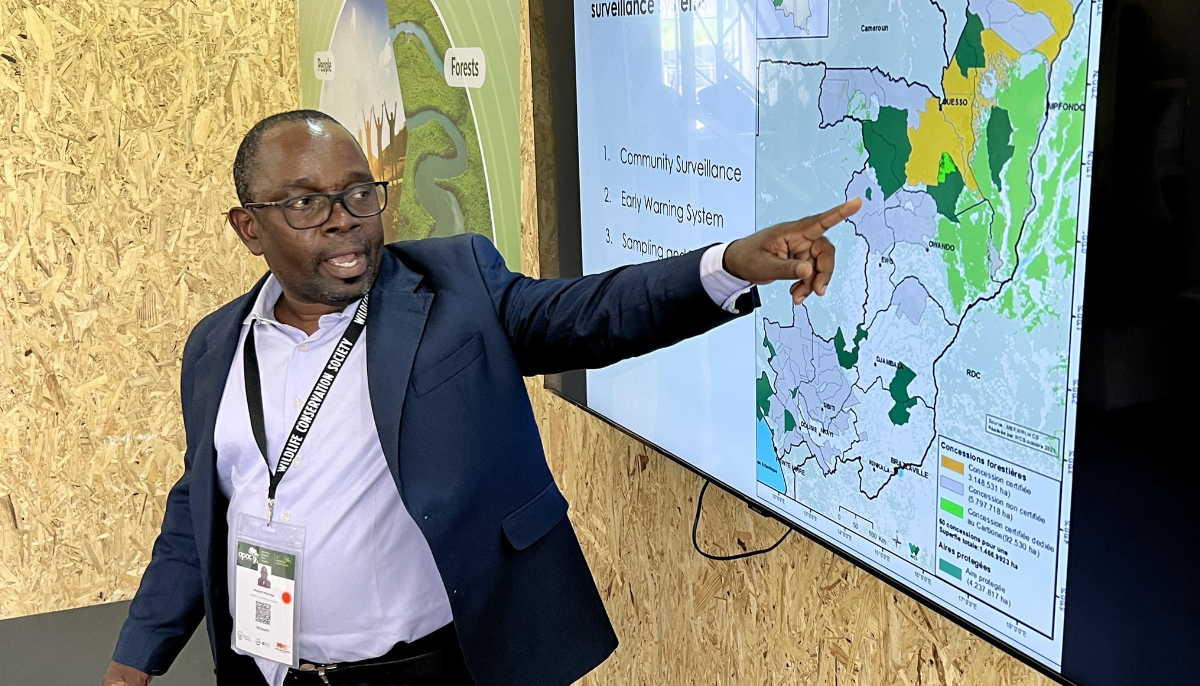
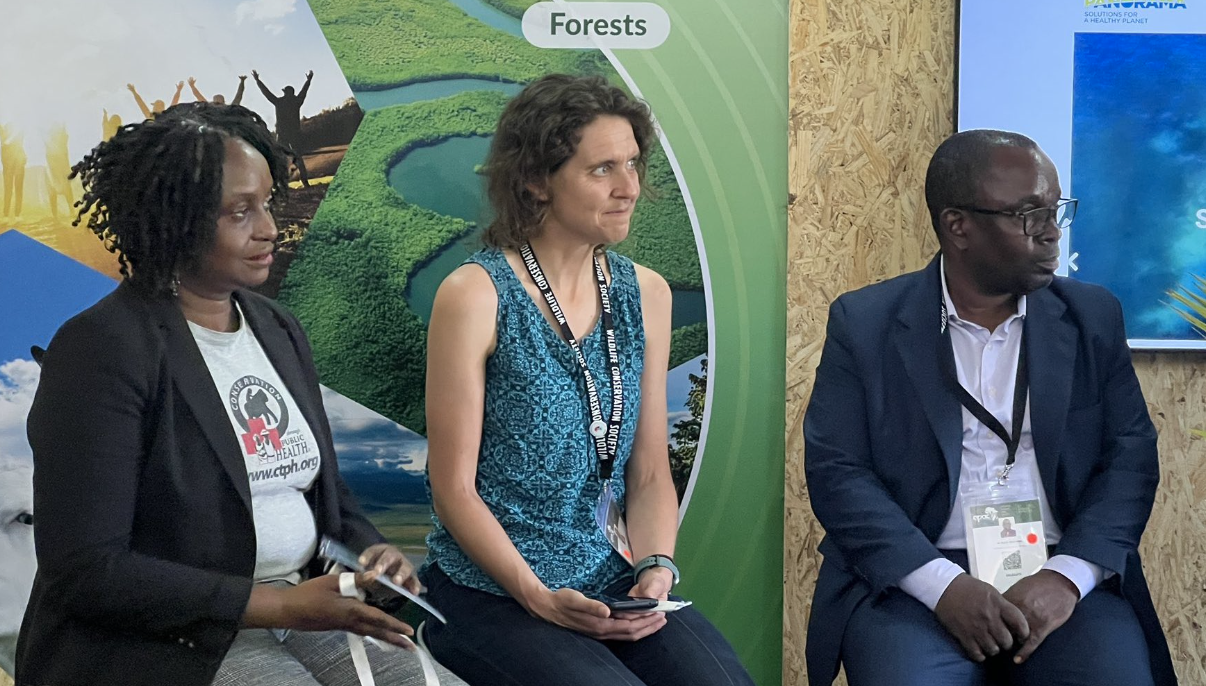
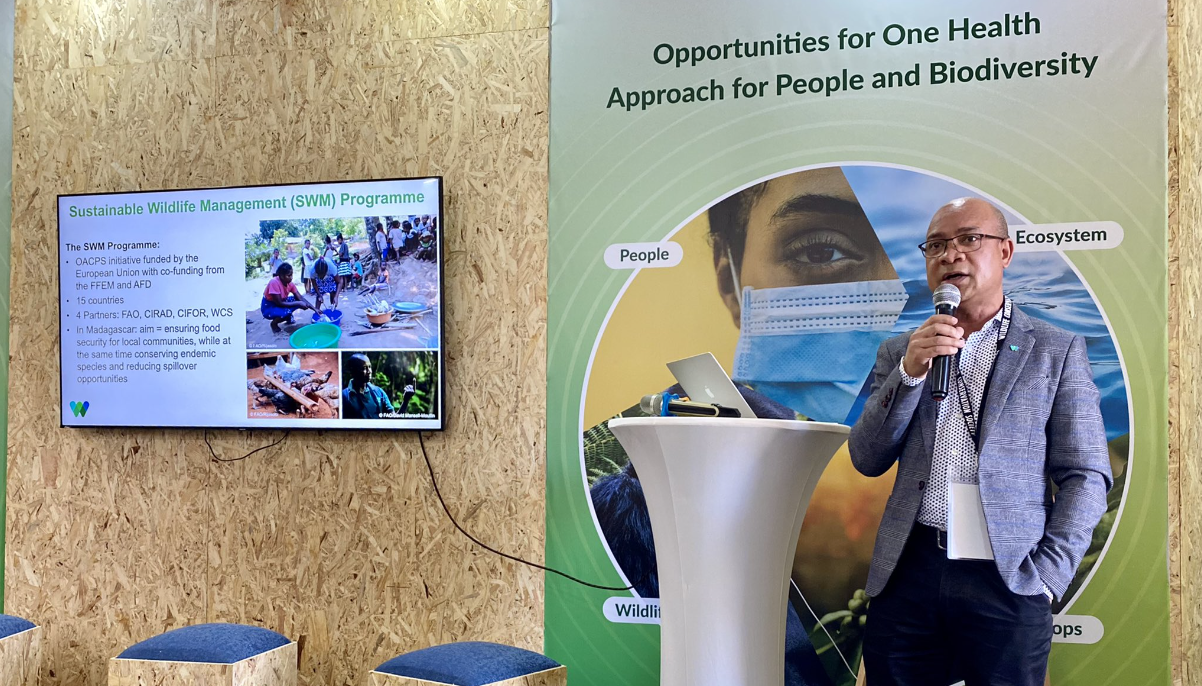 Various panelists at the IUCN One Health Pavilion during APAC 2022.
Various panelists at the IUCN One Health Pavilion during APAC 2022.
Land Use Planning
Dr. Kendall Jones, WCS Conservation Planning Specialist, presented in a session on a Land-Use Planning Training Methodology. Land-use planning is critical for identifying sustainable, climate-smart, win-win development strategies that minimize encroachment on high conservation or ecological value land while meeting multiple land-use objectives. However, knowledge and capacity for landuse planning is insufficient to meet needs across Africa. To meet this challenge, ABCG developed a Land-Use Planning Training Methodology, combining expert presentations with interactive group exercises to provide a comprehensive introduction into the theory and practical starting points of biodiversity sensitive land-use planning. This course was presented in the session (link to course materials), with participants receiving a broad overview of the course before engaging in some interactive demonstrations of the course content and group exercises. Other speakers included David Williams (AWF) and Gerald Mwakipesile (Ministry of Livestock and Fisheries – Tanzania). Learn more
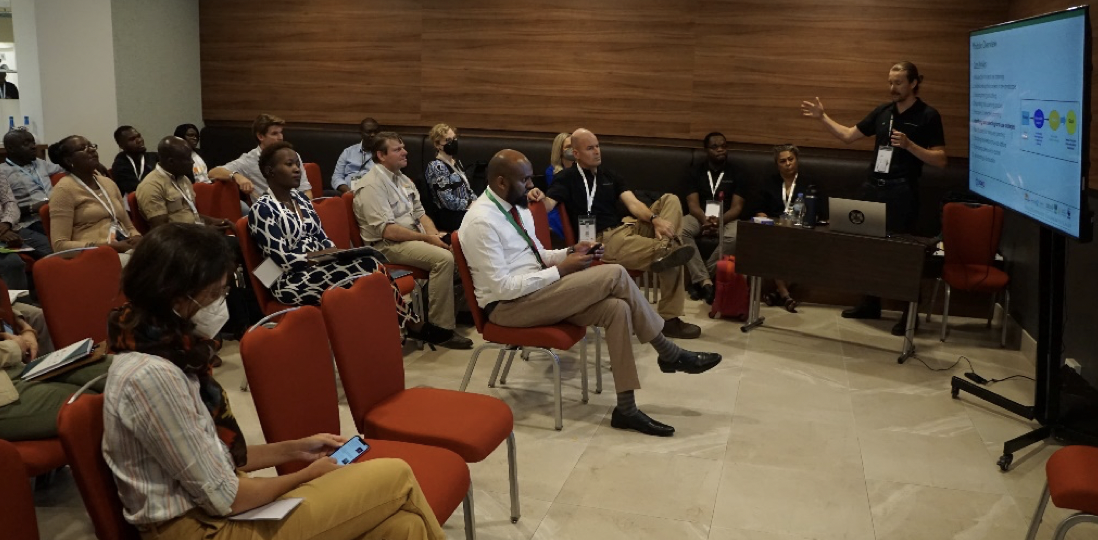
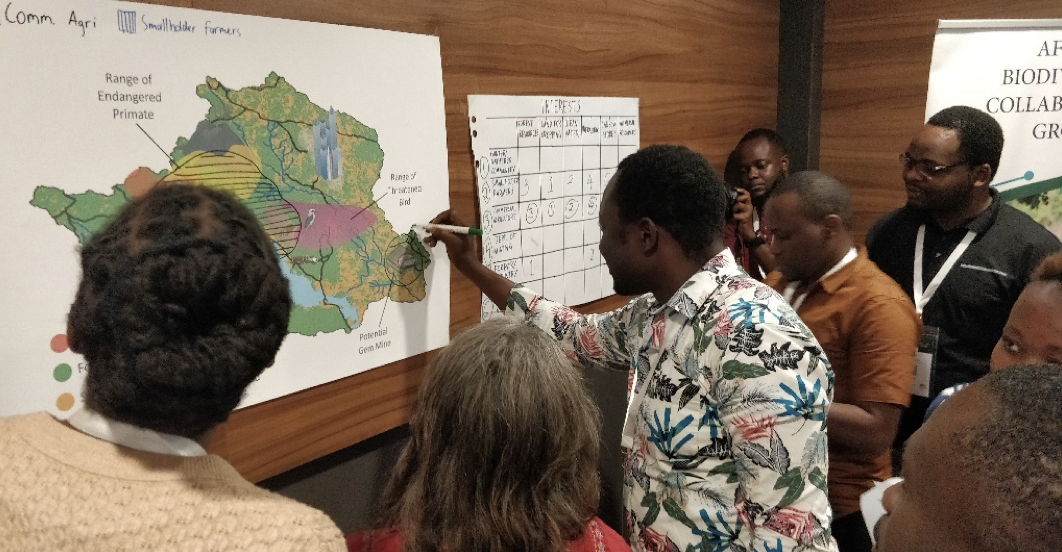 Left: Dr. Jones presenting on ABCG Land-use planning training methodology. Right: participants undertaking participatory mapping module from the land-use planning course.
Left: Dr. Jones presenting on ABCG Land-use planning training methodology. Right: participants undertaking participatory mapping module from the land-use planning course.
The COMBO+ programme
WCS hosted and participated in multiple panels on the COMBO+ programme, which aims to reconcile economic development and conservation objectives:
- Amrei von Hase (WCS), Fanny Boudet (Biotope), and Denise Nicolau (BIOFUND), part of the COMBO+ team, presented how best practice application of the mitigation hierarchy can help address the challenge of reconciling necessary project development (e.g. for renewable energy installations, mines, plantations, infrastructure) and nature conservation, which we need to survive and thrive on Earth. The COMBO+ programme, funded by AFD and FFEM, helps governments and their stakeholders and partners in 4 African and 2 Asian countries develop and implement policy on no net loss and net gain outcomes, in line with biodiversity targets. Experiences and lessons learnt from Madagascar and Mozambique were presented. Learn more
- Amrei von Hase (WCS) and Simon Nampindo (WCS Uganda) co-presented a panel with Mozambique and Madagascar conservation trust funds and Ambatovy mining company on supporting progress towards national biodiversity targets by improving mitigation policy and outcomes. A panel of experts discussed how avoidance, minimization, restoration and biodiversity offsets can help fully address impacts from development projects. They also showed how this approach can support better alignment of economic development with national biodiversity policy. This in turn will help avoid impacts on priority biodiversity, support contributions to the Global Biodiversity Framework and contribute to meeting national and international biodiversity targets. Learn more
- Amrei von Hase (WCS), Demba Marico (PRCM), Lucy Waruingi (ACC), Li WenQi (China Road and Bridge Corporation), and Gabi Teren (EWT) shared experiences as to how the AFD and FFEM funded COMBO+ programme takes a multi-pronged approach to working with governments, the private sector, civil society and financial institutions to improve the development and implementation of effective mitigation and offset policies – to reduce harm to nature and to support progress towards national and global biodiversity targets. In particular, the importance of avoiding impacts on priority biodiversity was emphasised and the need for alternatives analysis when designing projects.
- Carl Bruessow (Mulanje Mountain Conservation Trust), Kathleen Fitzgerald (Global Wildlife Program, World Bank), Amrei von Hase (WCS), and Ellane van Wyk (Wilderness Foundation Africa), shared experiences about tools for innovative financing of PCAs, CTFs, CMPs, biodiversity offsets and fiscal instruments (e.g., tax incentives).
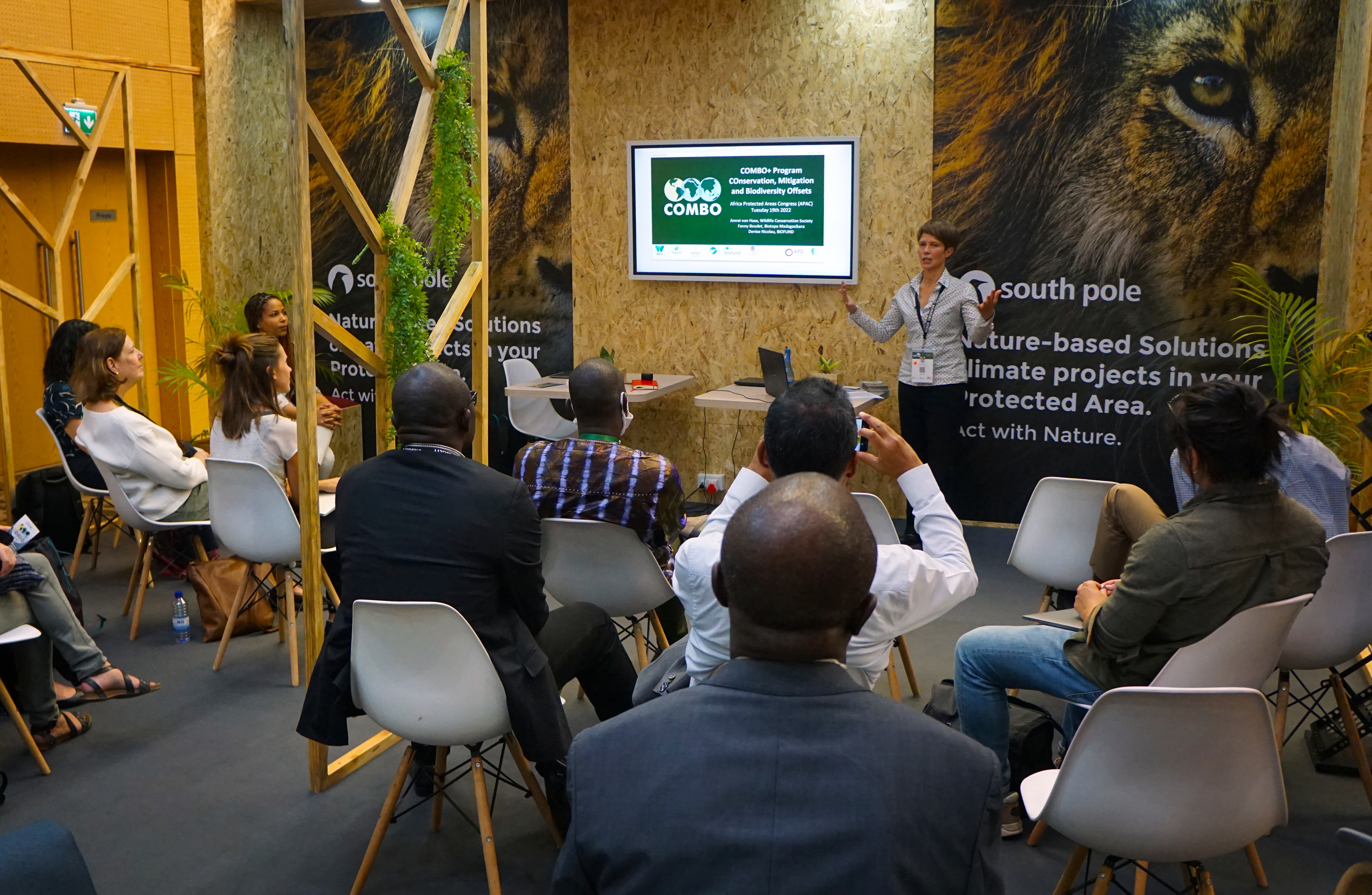
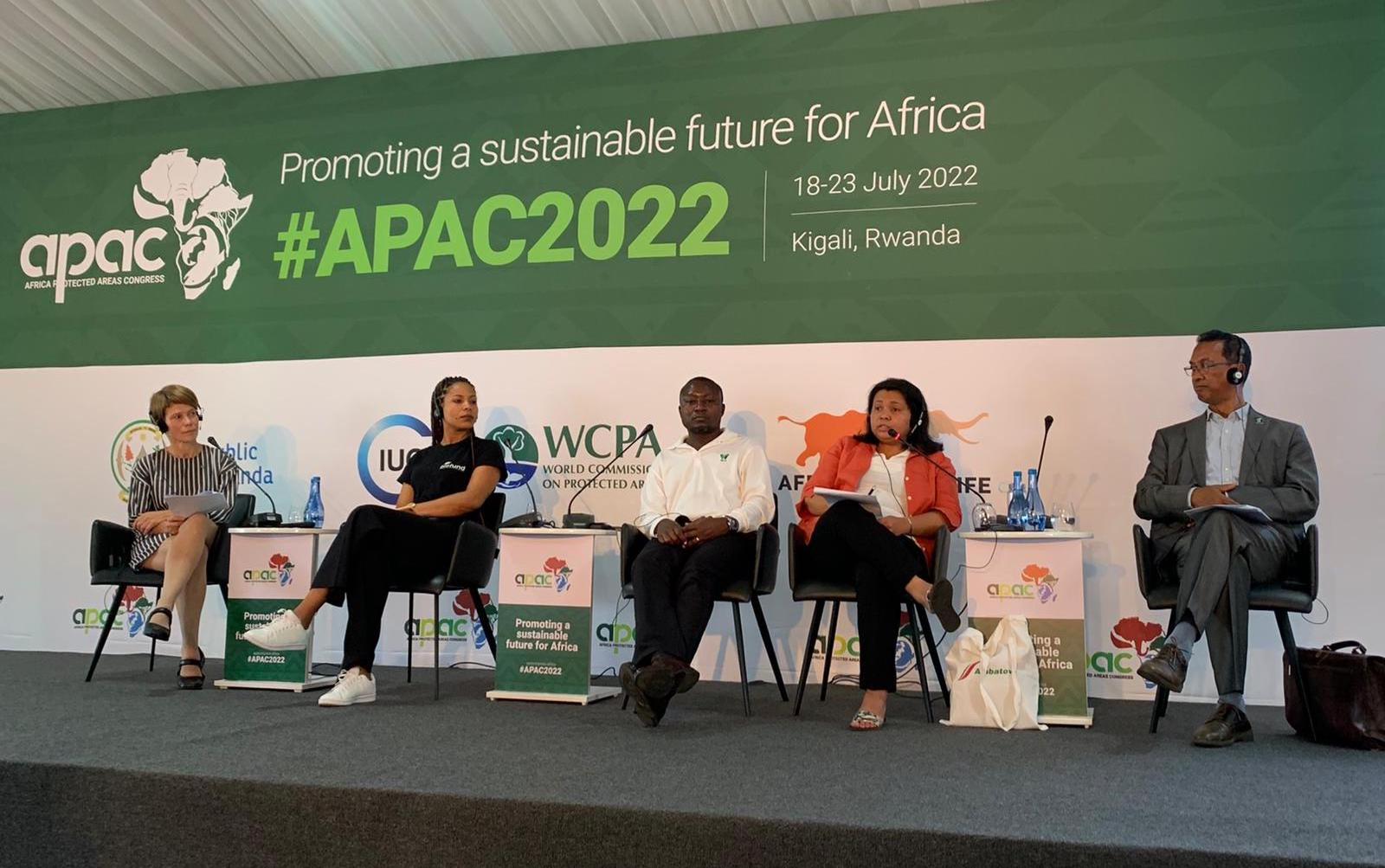
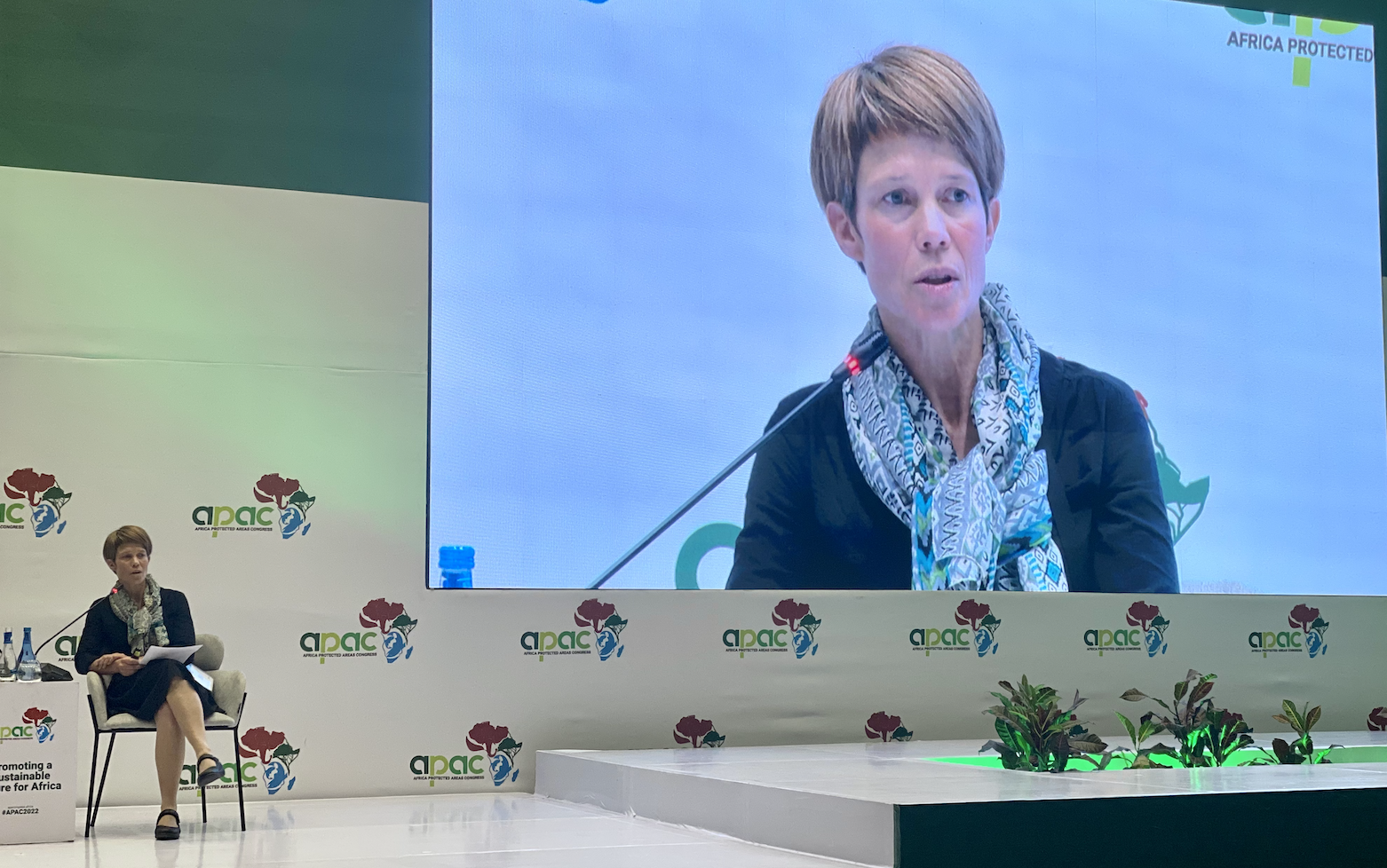 Amrei von Hase presenting at various sessions during APAC 2022.
Amrei von Hase presenting at various sessions during APAC 2022.
WCS team at APAC
 The full WCS team at the WCS booth at APAC 2022.
The full WCS team at the WCS booth at APAC 2022.
For more information, please contact:
Arnaud Goessens - Associate Director, EU Policy: agoessens@wcs.org
READ MORE
WCS in Africa: Protected Areas, People and Partnerships
Links between Ecological Integrity and Human Health
Best Practices to Confront Pandemics at the Source
WCS Recommendations to Reduce Pandemic Risk